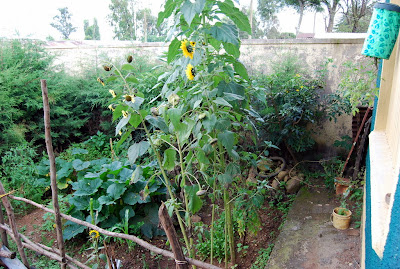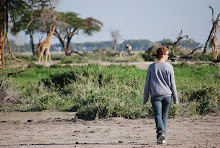The gawkers of Ethiopia sure got a treat today. If a ferengi alone attracts a lot of attention, and ferengi with a dog on a leash is laughable, imagine ferengi and dog in a public bus for ten hours! I have known for some time that I would take my dog to America one day, she’s family and there is no way I could ever leave her behind. But, taking my dog to America means actually taking her there myself, and all the misadventures that come with it, and that ten-hour bus ride to Addis was the one I was dreading the most.
Having my Ethiopian dog, Arbay, for the past year and a half in Ethiopia has been such a blessing. I got her after just one week in Dangila; picking her up off the street, bringing her to my town and starting to train her. I didn’t like the idea of living alone, and she was the perfect antidote. That one decision has shaped my entire Peace Corps experience. Hearing my landlord’s kids echo my commands throughout the day, even when Arb wasn’t around: “Sit!” “Stay!” “speak!” ; Running at 6am only because she woke up before my alarm and sat next to my bed crying, wanting me to get up and run with her; Pretending she wasn’t mine as she teased someone’s tied-up sheep enough that it broke its’ rope and ran down the street, my dog hot on its tail.
The kids that cheerfully yell “Jennifer! Jennifer!” as I pass each day also yell “Arbay! Arbay!” when I have her with me. I remember the first day I got her and how she threw up in the bus and wouldn’t walk with a leash; I should have known back then that she’d always have a mind of her own.
My landlord’s children, who watch Arbay when I’m out of town, think of her as more than just a dog. Everyone I tell that I’m bringing Arb to America simply says, “wushash sechine,… give me your dog.” And that command alone assures me that I could not leave her. If they understood what a ‘pet’ truly is they would never suggest that I just give her away. They like her, they feed her, and they think she’s cute, but they don’t think of her as part of the family. If I left her with any of those people she would never sleep inside, they would never pet her, and she would never get a bath. They just don’t get it.
Having a dog has also taught me a lot of new Amharic. Without Arbay my third person female conjugations just wouldn’t be the same. “She does not bite,” “she will not eat you,” “she loves to run.” And occasionally, if a group of obnoxious kids asks, “she bites!” If I go to certain neighbors house without her they ask where she is, as if she is always suppose to be with me. They ask what she eats, where she sleeps, how she is so clean. It’s almost as if I were raising an alien, not an animal that is in abundance here.
In the days leading up to Arbay’s permanent departure we went around to visit all the homes that have shown her love and given her meat since she was a puppy. They patted her head and said “selam” one last time as she raised her paw to shake their hand. I spent a while at my landlord’s house having a photo shoot of Arbay and the kids. The day before we left my landlord’s kids, Eyerus and Yenebeb, and I went on a final run, out to Arbay’s favorite rural area where she trots with her crooked gait through the cattle and donkey carts, and gallops through puddles and fields of tef. That afternoon Eyerus and a friend came over to hangout one last time with Arbay. She is probably the person who had bonded with Arb the most and really gets it.
Having a dog has also taught me a lot of new Amharic. Without Arbay my third person female conjugations just wouldn’t be the same. “She does not bite,” “she will not eat you,” “she loves to run.” And occasionally, if a group of obnoxious kids asks, “she bites!” If I go to certain neighbors house without her they ask where she is, as if she is always suppose to be with me. They ask what she eats, where she sleeps, how she is so clean. It’s almost as if I were raising an alien, not an animal that is in abundance here.
In the days leading up to Arbay’s permanent departure we went around to visit all the homes that have shown her love and given her meat since she was a puppy. They patted her head and said “selam” one last time as she raised her paw to shake their hand. I spent a while at my landlord’s house having a photo shoot of Arbay and the kids. The day before we left my landlord’s kids, Eyerus and Yenebeb, and I went on a final run, out to Arbay’s favorite rural area where she trots with her crooked gait through the cattle and donkey carts, and gallops through puddles and fields of tef. That afternoon Eyerus and a friend came over to hangout one last time with Arbay. She is probably the person who had bonded with Arb the most and really gets it.
We sat on my front porch to play with Arb for a while and say goodbye. I really started to get sad myself about Arbay leaving. I know I’m the one taking her, and it means I’ll get to have her with me for years to come, but I also will have to live in Dangila for two months without her, something I’ve never done before. I also began to realize how hard my own goodbyes with Dangila are going to be in the very near future. But this week is about Arbay, and I’m glad she had her proper farewell to the town she loves.
I stood on my front porch at 5am this morning waiting for this arranged minibus to show up to take me, Arbay, and way too much luggage to Addis. My friend and I had arranged with one of the bus station workers a couple days before for a bus to pick Arbay and me up at my house, and deliver me to where I was going in Addis, all for a reasonable ferengi price. When the driver arrived and doubled the price I didn’t have much room to bargain, so I told them to load the bags. My very old guard mumbled how it would be a lot easier if I just left the dog with my landlord. He really doesn’t get it.
We bounced down the road south for a few hours as the sun was rising out our left window. We arrived in Debre Markos at 8am and the driver who kept calling me “my Jennifer” passed me along to a big bus, driven by, “my brother.” I was skeptical by the exchange but I heard him tell the new driver to get me to my house, so I didn’t question it. Arbay was a gem, sitting beside me on the seat the whole time, staring out her window, sticking her nose into the cracked window to feel the breeze, drawing attention every time the doors opened and only throwing up once.
Ten hours later we pulled into the bus station and they announced it was the final stop. “Excuse me,” I said in Amharic to the bus driver, “I paid to go to my house.”
“No you didn’t,” he replied.
I tried my best in broken Amharic to be pissed off and angry. I explained that I had a dog, huge suitcases, and I paid to go all the way to my house. Luckily one other passenger had been traveling with me since the beginning and knew exactly how much I paid (of course) and told them that I did in fact have a deal to be delivered to my house. We got the Dangila bus station guys on the phone who denied my claim, and I yelled between tear that I had no money and had no other way to get to my house, hoping he’d have pity on me. The crowd of bus station workers that had boarded the now empty bus I remained on was growing. They listened to my sob story and tried to talk to the Dangila folks themselves to no avail. At this point I was exhausted, fed up and not loving Ethiopia so I let the tears flow, not holding back the culturally inappropriate display of emotion.
Apparently when I heard the two drivers talking about getting me to my house I missed the verb “to see off,” a crucial mistake changing the meaning to, “You must see Jennifer off to a minibus to her house,” not, “You must get Jennifer a minibus to her house.” Everyone felt bad for me and they kept retelling my story to more and more people who joined the crowd. Just as I was cursing the bus station employees who ripped me off this morning, the Addis guys made up for all my negative thoughts. They pooled their money (an elderly lady walking by even pitched in 10 Birr) and paid for my taxi to where I needed to go. I was amazed by their generosity, and while I had money to cover the fare in my pocket, I’d told such a good story over the phone about not having money that I couldn’t pull out the money now. I graciously accepted their offer, allowing their kindness to redeem Ethiopia in my mind for the day.
A few more days until Arbay and I are on a plane to America! I couldn’t be more excited, and I’m glad I get to leave Ethiopia on a positive note.
We bounced down the road south for a few hours as the sun was rising out our left window. We arrived in Debre Markos at 8am and the driver who kept calling me “my Jennifer” passed me along to a big bus, driven by, “my brother.” I was skeptical by the exchange but I heard him tell the new driver to get me to my house, so I didn’t question it. Arbay was a gem, sitting beside me on the seat the whole time, staring out her window, sticking her nose into the cracked window to feel the breeze, drawing attention every time the doors opened and only throwing up once.
Ten hours later we pulled into the bus station and they announced it was the final stop. “Excuse me,” I said in Amharic to the bus driver, “I paid to go to my house.”
“No you didn’t,” he replied.
I tried my best in broken Amharic to be pissed off and angry. I explained that I had a dog, huge suitcases, and I paid to go all the way to my house. Luckily one other passenger had been traveling with me since the beginning and knew exactly how much I paid (of course) and told them that I did in fact have a deal to be delivered to my house. We got the Dangila bus station guys on the phone who denied my claim, and I yelled between tear that I had no money and had no other way to get to my house, hoping he’d have pity on me. The crowd of bus station workers that had boarded the now empty bus I remained on was growing. They listened to my sob story and tried to talk to the Dangila folks themselves to no avail. At this point I was exhausted, fed up and not loving Ethiopia so I let the tears flow, not holding back the culturally inappropriate display of emotion.
Apparently when I heard the two drivers talking about getting me to my house I missed the verb “to see off,” a crucial mistake changing the meaning to, “You must see Jennifer off to a minibus to her house,” not, “You must get Jennifer a minibus to her house.” Everyone felt bad for me and they kept retelling my story to more and more people who joined the crowd. Just as I was cursing the bus station employees who ripped me off this morning, the Addis guys made up for all my negative thoughts. They pooled their money (an elderly lady walking by even pitched in 10 Birr) and paid for my taxi to where I needed to go. I was amazed by their generosity, and while I had money to cover the fare in my pocket, I’d told such a good story over the phone about not having money that I couldn’t pull out the money now. I graciously accepted their offer, allowing their kindness to redeem Ethiopia in my mind for the day.
A few more days until Arbay and I are on a plane to America! I couldn’t be more excited, and I’m glad I get to leave Ethiopia on a positive note.






















